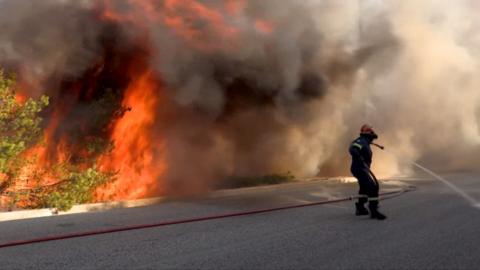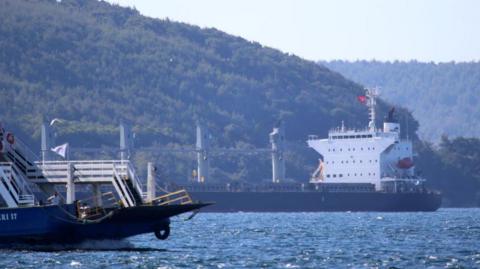Undercover in the Jungle: A Political Farce Disguised as Investigative Journalism
Hello everyone. Let’s talk about this so-called undercover masterpiece – a year-long BBC investigation into smugglers in northern France. What we’ve got here is essentially a tale of tension, paranoia, disguises, and a lot of shuffling around forests, but dressed up as though the protagonist was James Bond on a humanitarian mission. Let’s put the brakes on the hype train for a moment, shall we?
The Forest of Delusion
The reporter strolls toward a smuggler’s camp in Dunkirk, wires hidden, secret camera in the pocket, and a ticking battery life like it’s the final countdown before the nuke in a Call of Duty mission goes off. We’re told repeatedly how dangerous it is, how they only have “three hours of battery,” as though the only thing standing between democracy and chaos is an Anker power bank.

I can’t fault the bravery – walking into a forest full of paranoid criminals is not exactly my idea of a spa day – but the drama here is like a bad quick-time event: pacey but with little real payoff. Instead of giving us concrete dirt on systemic weaknesses in border control or naming concrete operatives, we get mood-setting wardrobe descriptions of scuffed shoes and fake-worn jackets. Riveting… if you’re into cosplay conventions for aspiring fugitives.
Role-Playing the Desperate Migrant
The author “becomes” Abu Ahmed, a down-on-his-luck Syrian refugee rejected by Germany. This is the persona they’re banking on to get past the gang’s radar. From a role-playing perspective, decent commitment – think Skyrim character creation but without the satisfaction of fireball spells – but there’s a whole whiff of self-importance here. It’s clear they want the reader to feel the weight of the performance, yet we barely scratch the surface of what these gangs actually fear or how they operate beyond swapping SIM cards like GTA players swapping getaway cars.
The smugglers have guns and knives; there’s only one path in and out of the camp. Cue ominous music. I half expected a HUD to pop up with a “Stealth Failed” alert when Abdullah, the smuggler, asks for journey photos – a classic NPC dialogue check for lies. The undercover agent passes, apparently, but I’m left wondering: where’s the real interrogation of the system that allows these operations to persist?
Gameplay Loop: Collect Numbers, Lose Numbers, Repeat
We then grind through the long monotonous questline of collecting migrant gossip at train stations, beaches, and food lines. Yes, it’s essential to intel gathering – but narratively? It feels like fetch quests in an open-world RPG: pick up item, lose progress when smugglers change numbers, start over. There’s tension, sure, but tension without evolving stakes just becomes fatigue.
Multiple burner phones, multiple identities, multiple languages… and yet all roads lead to the same vague revelations: gangs have code words, they operate in “the jungle,” and they control routes. Groundbreaking stuff. Meanwhile, there’s zero political reckoning for how this cross-border mess became a lucrative shadow economy right under the noses of governments who’d rather point fingers than fix policy leaks.
Operation Suspense: Did It Work?
The piece closes on the big cliffhanger: did the camera work? Was Abdullah’s role confirmed? Honestly, by this point, I feel like I’ve been strung along through a Telltale Games episode with the final “choice” being whether to care or not. And this is where the political outrage should’ve detonated like a well-timed boss fight – but instead, we shuffle back to base, unsure if we have the damning footage or just a bunch of atmospheric B-roll.

The Political XP Gain? Minimal.
Here’s the rub: undercover journalism like this risks life and limb, but without turning intelligence into systemic accountability, it’s just danger tourism with a microphone. This isn’t purely the fault of the reporter – they’ve done their stealth missions. But the narrative plays more like a personal diary than a political exposé that forces the powers-that-be to put their hand on the big red “Do Something” button.
In political terms, it’s another missed opportunity to shine a full floodlight on the smugglers’ economic models, their political shields, and the cross-border incompetence that lets them thrive. Instead, we got an immersive but incomplete side quest that leaves you wondering if the main storyline will ever trigger.
Danger without accountability is theatre, not journalism.
Final Verdict
This report has heart, guts, and some tense moments worthy of a stealth game’s best missions. But as a political review, it lands more “side quest filler” than “main plot revelation.” High on atmosphere, low on actionable intel. It’s an intense field report dressed as a systemic exposé, and it doesn’t quite level up to that claim.
Overall impression: good investigative effort, underwhelming political impact.
And that, ladies and gentlemen, is entirely my opinion.
Is my secret camera working? – posing as a migrant to infiltrate a cross-Channel gang, https://www.bbc.com/news/articles/c04r5y5xv11o



